






Posted: 09/17/2019
By Christopher A. Brown
Two new federally-funded, independent evaluations add to the efficacy of 24/7 Dad®, the flagship, evidence-based program of National Fatherhood Initiative® (NFI), especially when implemented as part of a comprehensive intervention that addresses dads’ fathering and non-fathering needs.
Research teams at the University of Louisville and Auburn University-University of Maryland conducted evaluations of fatherhood programs that use 24/7 Dad® as the foundation of their component that builds dads’ pro-fathering attitudes, knowledge, and skills. These programs imbed 24/7 Dad® into comprehensive interventions that address the fathering and non-fathering needs of diverse dads who are primarily low-income, noncustodial, and nonresidential.
4 Your Child
The research team at the University of Louisville conducted a preliminary project evaluation (i.e. the evaluation is still ongoing) of 4 Your Child, based in Louisville, Kentucky. 4 Your Child is a responsible fatherhood intervention for nonresident fathers ages 16 and older that increases their capacity for taking more active roles in their children’s lives. It includes 28 hours of parent education and up to 6 months of case management services. The parent education component of the program contains fatherhood, parenting, and healthy relationship training delivered via group workshops that features content from 24/7 Dad®.
The team evaluated the impact of the program on 505 dads served in locations in several Kentucky counties. More than 93 percent of the dads were Black or White with a roughly equal distribution between those two groups. Most of the dads were single, had a high school diploma or GED, were unemployed, and had an income of less than $25,000 a year.
To evaluate the impact of 24/7 Dad®, the team used the Fathering Survey, the evaluation tool included with the program. This tool measures the impact of the program on pro-fathering attitudes, knowledge, and self-efficacy (skills) related to the content in the curriculum. The dads completed the survey before they started 24/7 Dad® (pre-program) and after they completed it (post-program). The team found that the 24/7 Dad® had a highly significant effect (p<.001). Armon Perry, PhD, who led the research team, concluded that:
“These results provide support for the efficacy of 24/7 Dad® in increasing skills that are central to fathers’ ability to take more active roles in their children’s lives.”
To learn more about the details of the impact of 24/7 Dad® and the other components of 4 Your Child, download and read the report. Of particular importance is the impact of 4 Your Child on conflict resolution skills. NFI staff will continue to monitor this evaluation. A final evaluation report on the project should be available in late 2020.
20 Alabama Fatherhood Programs
The Auburn University-University of Maryland research team conducted an evaluation of 20 fatherhood programs across the state of Alabama that serve nonincarcerated, noncustodial dads. The team assessed multiple target outcomes over a one-year period. They explored variations in retention and in outcomes based on geographic setting of the programs (rural or urban), sequencing of services (case management and classes), and dads’ race. The fatherhood programs provide a comprehensive intervention that addresses dads’ involvement with their children and economic security. Dads receive around 150 hours of services that include curricula-based instruction on parenting, coparenting and employability-related skills, and case management. Each of the programs uses 24/7 Dad® as the component that builds pro-fathering attitudes, knowledge, and skills.
The team evaluated the impact of the fatherhood programs on a combined 630 dads. The sample was similar to that in the evaluation of 4 Your Child. Ninety-four (94) percent of the dads were either Black or White with a distribution of 60 percent Black and 34 percent White. Most of the dads were single, had a high school diploma or GED, were unemployed, and had an income of less than $20,000 a year.
The team employed a number of evaluation tools completed by dads before they started the program (pre-program), after they completed the program (immediate post-program), six months after they completed the program, and one year after they completed the program. (Note that not all 630 dads completed the six-month and one-year follow-ups.) This team found that the dads experienced significant sustained improvement on 14 outcomes over a one-year period. These outcomes fell within the following areas:
The team placed these outcomes within the 5-Factor Strengthening Families Protective Factor Framework. This framework consists of the following factors that research shows reduce the risk of child abuse and neglect: Social Connections; Parent/Family Resilience; Knowledge of Parenting and Child Development; Social and Emotional Competence of Children; and Concrete Support in Times of Need. Using this framework, these programs built those protective factors in dads, thus reducing the risk that they will neglect or abuse their children.
This team did not include an evaluation tool that measured the impact of 24/7 Dad® specifically. Nevertheless, because it served as the fathering education component for the comprehensive intervention in all 20 programs, it undoubtedly contributed to the positive impact on the protective factors. (Indeed, as noted in this previous post, a research team at the University of Texas at Austin found that 24/7 Dad® helped build these protective factors in 645 dads in Texas. Click here to download and read that report.) The Auburn University-University of Maryland research team concluded that this evaluation provides:
“…validation that a diverse group of fathers served in fatherhood programs in diverse settings experienced changes sustained for up to one year in many target areas related to family strengthening and protection of children from maltreatment. This is quite impressive for an educational program with support services. We also find positive growth in areas, such as coparenting and monthly income, that were not evident in other studies (e.g., Avellar et al., 2018). The emphasis in our sites on healthy relationship skills in the 24/7 Dad® curriculum may help explain this difference [emphasis added], as most sites in other studies provide this information as optional services.”
To learn more about the details of the impact of these 20 Alabama fatherhood programs, download and read the report. Of particular importance is what the research team learned about the importance of the sequencing of components within a fatherhood program (i.e. the order in which a program provides its components) on retention rates and outcomes, a little understood dynamic until now. The evaluation also uncovered some differences in impact on urban versus rural dads and dads of different races.
These two evaluations add to the growing body of research and evidence on the efficacy of 24/7 Dad®. All of us at NFI thank these two research teams for conducting the evaluations and the United States Department of Health and Human Services for funding these and other evaluations of fatherhood programs.
Are you aware of the importance of imbedding NFI’s fatherhood programs within comprehensive interventions that address dads’ fathering and non-fathering needs?
Are you aware that evaluations have shown a positive impact of 24/7 Dad® on reducing the risk of child abuse and neglect?

Posted: 03/12/2019
By Christopher A. Brown
Blown away.
That’s how I reacted upon learning of the success of 24/7 Dad® program facilitator Tim Morgan running the program in five diverse locations in Abilene, Texas.
Tim is new to this work. He joined the Fatherhood EFFECT program of BCFS Health and Human Services as a parent educator in July of 2018.* Although he didn’t have experience running a fatherhood program, he instinctively knew that he had to take BCFS’ program to dads. If you’ve attended a training on any of our programs, you know that “Going to Where the Dads Are” is an NFI recruitment and retention mantra.
In January Tim sent me an unsolicited email that summarized his experience getting the program launched in each of the locations. (Tim’s not shy about sharing his success or challenges with anyone. He’s one of the top contributors in the Father Engagement Learning Community™.) He noted where he had facilitated 24/7 Dad® and, for each location, the number of dads who started the program and graduated, the pitfalls he encountered, and how he planned to work with his primary contact to avoid those pitfalls with future groups.
What stood out to me was that, despite the pitfalls he encountered, 48 men started the program and 28 graduated from it. While that might not seem like a lot of dads, if you’ve ever tried to get a fatherhood group off the ground, I’m sure you’ll agree that’s a great start.
So, I asked Tim how BCFS had gotten the program into each of the locations in the first place. (After all, it doesn’t matter how good a program you have if you can’t convince potential community partners it will be valuable to them and the dads they serve.) In addition to going to where dads are, what Tim shared is a prime example of two other recruitment and retention tactics we encourage programs to use.
Rise Discipleship and Abilene Dream Center
Both of these locations are faith-based residential recovery centers for men. BCFS enjoys a long relationship with both centers. The men admit themselves to the centers and are typically referred by the court or probation and parole. Both centers require dads to enroll and graduate from 24/7 Dad®.
Taylor County Substance Abuse Treatment Facility and Grand Works Halfway House
BCFS also enjoys a long relationship with both of these organizations. Dads’ attendance in both locations, however, is voluntary. The Taylor County Substance Abuse Treatment Facility (SATF) is a correctional facility that serves high-risk offenders with substance abuse issues. Grand Works Halfway House (GWHH) serves men with substance abuse issues, many of whom are on parole. Both environments encourage enrollment and participation. Indeed, the Taylor County SATF has had a full group (e.g. 12 dads) every time they’ve run one.
Although a single point of contact in both locations recruit dads—the program director at the Taylor County SATF and the house manager at GWHH—Tim said that the main reason for the success in both locations is word-of-mouth. 24/7 Dad® graduates talk about the class with dads who haven’t participated in it and encourage them to enroll. Tim also stops by GWHH when he’s not facilitating to recruit dads.
Dyess Air Force Base
While BCFS had a relationship with Dyess Air Force Base, it hadn’t resulted in success for Fatherhood EFFECT. BCFS had a hard time recruiting dads into the 24/7 Dad® program offered off-base. So, Tim presented on the program to personnel at the clinic on base—a group that included doctors, nurses, social workers, and case managers—and encouraged them to offer the program on-base. That approach worked. BCFS started a group open to dads in the Air Force. Also eligible were dads who were spouses of moms in the Air Force.
To recruit dads, Tim:
BCFS graduated five dads from the first group. Those graduates advocated for extending the program to 10 weeks, which decision makers approved. Moreover, they spread the word to other dads. This word-of-mouth, along with more flyers and emails to master sergeants, resulted in a full house of 12 dads enrolling in the second group.
Tim’s experience points to the type of community partner that can provide an ideal setting for recruitment and retention.
What existing relationships can you leverage into a winning recruitment and retention effort?
Which recovery- or corrections-focused organizations might be willing to offer a fatherhood program at their location?
Where else can you deliver the program where dads are so that they don’t have to come to you?
* EFFECT stands for Educating Fathers for Empowering Children Tomorrow. It’s funded by the Texas Department of Family and Protective Services, Prevention and Early Intervention Division. For more information on the program, click here to read an evaluation of it that includes the impact of 24/7 Dad® on reducing the risk of child abuse and neglect.

Posted: 10/30/2018
By Melissa Steward
Talk about turning nothing into something. When Brandon Gregory joined You Medical 2 years ago, they didn’t have much of a fatherhood program. A few men met informally here and there, but generally, programs in the center focused on moms.
Imagine my surprise when I received one of the most attractive, yet simple, emails announcing You Medical’s upcoming 24/7 Dad® Group with two well-designed and useful pieces of marketing collateral attached. I recently spoke with Brandon to hear how they got to this point at You Medical, and how they experimented to find success.
[Scroll to end for free marketing materials and samples.]
 |
| Brandon Gregory |
Brandon had a challenging road ahead of him when he joined the You Medical pregnancy help center. He wasn’t experienced running fatherhood programs, heck he was only a father of 2 months himself – yet his passion to help dads drove him in the right direction.
Initially, he simply met with the dads that came through the center to help them through the process of the pregnancy, whether it was planned or unplanned. When he started looking for something “reproduceable” that he could use to train the dads, he happened across NFI’s 24/7 Dad® program sitting on a shelf in the center. Eventually, “a few guys meeting occasionally” turned into a group of guys meeting on Thursday nights for 24/7 Dad®.
To recruit dads beyond the ones already visiting the center, You Medical partnered with their local health department, and offered 24/7 Dad® sporadically alongside teen pregnancy classes in their local high school. They also worked hard to network with local organizations and churches to recruit dads.
But they still faced challenges. Brandon was running the 24/7 Dad® sessions as an open group, which meant dads could come and go as they wished. He quickly learned that it hindered his ability to keep the dads coming back through all 12 sessions. He also faced a lack of commitment and poor attendance when he offered sessions around the Holidays.
But Brandon and his team never gave up. They realized that they needed to create consistency in hosting the program, find a way to steadily recruit dads, and get them to join the group on the start date — and keep them for more than just a few weeks.
To take their program to the next level, Brandon used what I call it the STOP – START approach.
He STOPPED:
He STARTED:
Of, course, Brandon can’t do all of this alone. He’s got some awesome volunteers that provide one-on-one coaching to the guys in the center, and are currently training to help run their 24/7 Dad® group (the 24/7 Dad® sessions running right now are actually being facilitated by two volunteers!) You Medical is also hoping to have a couple of the fathers currently attending 24/7 Dad® transition to volunteering with the program in the next year or so.
In closing, everyone who chooses to serve fathers will take a different course. But the things Brandon and the You Medical team learned and implemented can be used by anyone wanting to be successful in serving fathers.
Free Marketing Materials and Samples
Brandon and You Medical gave NFI permission to share the marketing pieces they use to inspire you to create something similar for your program. They (and we!) hope you can find success serving fathers in your organization and community.
24/7 Dad® Calendar:
Brandon says, “I like to provide the guys with the dates of the group upfront so that they can make plans to be there. It works nicely coupled with the Fatherhood pledge and other relevant information. I give them one piece of paper with everything that they need to know included. This way, they are never ambushed and they always know what is coming up next week, especially helpful for planning to have holidays off. The publisher file itself can be a challenge to work with because calendars are tricky, but it has been a helpful tool.”
24/7 Dad® Poster (11x17 and printable on your average office printer):
“Our marketing director, Esther Orozco, made this poster for us using copyright free pictures and our group information. I email these to organizations that work with dads to remind them to refer dads to us. For the group we’re kicking off this week we had a dad who was sitting in our WIC office, saw this poster, and called me to sign up for a group. We also get referrals from CPS, the jail, 211, and the drug court.”
Eventbrite:
“As long as you don’t charge to get a ticket, this is an easy, free option for the first night of the group. This allows me to see who is at least committed enough to click a link and reserve a seat. This also gives me an idea of how many people will be at the group so that I can plan the handbooks, the amount of coffee, and how many copies I need.”
24/7 Dad® Announcement Email:
“For each new round of 24/7 Dad, I send out an email to my contacts. It includes an update on the latest session (if applicable), an announcement about the next group, start date, brief description of the commitment, link to the Eventbrite registration page, and contact information for questions.”
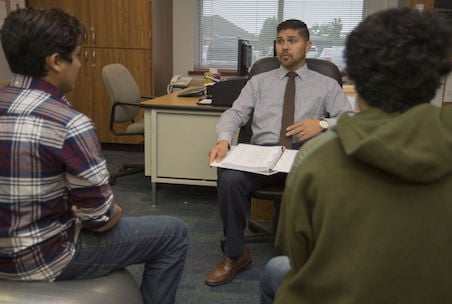
Posted: 09/20/2016
By Melissa Steward
I get this question often by phone and email, "Do you have any programs to help teen dads?"
My answer is "Yes!" Which is why I'm excited to see the work Martin Castaneda is doing in Midland, Texas. In this post, you will see how he is using the 24/7 Dad® program to help teen dads.
We have written on The Father Factor about more organizations seeking to help teen dads as well as about teen dads Martin has previously helped. Martin Castaneda is the fatherhood engagement coordinator for First 5 at University of Texas of the Permian Basin. The full article for this post recently appeared here.
Midland students who are fathers can now opt to join parenthood classes. The district launched the 24/7 Dad® program last Monday to provide support for teen dads until high school graduation.
Martin Castaneda said there was a need to introduce a program for teen dads in Midland schools. “We found it was one of the most underserved demographics out there,” Castaneda said. “We thought we should help those guys, seeing that fathers have an impact on a child’s life.”
Any male Midland student who is expecting or has a child can voluntarily join the program. Sessions are offered once a week at Coleman, Lee and Midland high schools during rotating class periods. Discussion topics include pregnancy, discipline and relationships with female partners.
Castaneda is partnering with XY-Zone — a program for at-risk males in MISD — to incorporate sessions into class schedules. Mike Mills, XY-Zone director, said student dads benefited from gathering last week.
“There’s not only a mentor they can come meet with, but peers as well,” Mills said. “They didn’t know about each other. It’s good for them to know they’re not going through it alone.”
For the sessions, First 5 uses National Fatherhood Initiative’s 24/7 Dad® program. Castaneda said his organization was the first in Texas to offer the program to fathers in high schools.
Midland had about 60 pregnancies last school year, according to a previous Reporter-Telegram article. That number was a drop from 156 pregnancies during the 2011-2012 school year, when the district introduced abstinence-based sex education programs.
“Teen parenthood is a growing thing,” Castaneda said. “The numbers have gone down nationally, but in Texas, still, rates are high for teen pregnancies. I’m hoping to get the message to those it’s too late for, and I hope they will pass it along to their friends.”
Castaneda has used 24/7 Dad® in Ector County for two years and said he’s noticed results for student fathers.
“We’ve seen improvement across many standards — grade improvement, dropout decreases, better relationships,” Castaneda said. “It’s had a positive impact on everyone.”
Midland already offered support for female students, but last year the district considered ways to engage teen dads. When the district looked for programs, the 24/7 Dad® curriculum stood out.
“We really liked the research-based aspect of it,” said Bradi Simpson, pregnancy related services coordinator for Midland. “Martin was very successful in Odessa schools. He came highly recommended.”
The Life Center runs Mothering as Responsible Youth (MARY), a mentoring program for teen moms in the area. Misty Stewart, MARY coordinator, said she plans to encourage group members to tell the fathers of their children about 24/7 Dads.
“Martin is working to keep dads in school, and I’m doing the same with the moms,” Stewart said. “That’s good for their kids.”
Coordinators for 24/7 Dad® began informing teen dads about the program this past week. But Castaneda said it’s difficult to find participants. He encourages people who want to join to email him at castaneda_m@utpb.edu.

Posted: 02/24/2016
By Christopher A. Brown
More organizations are using National Fatherhood Initiative’s 24/7 Dad® program with teen dads.
This fact was underscored a couple of weeks ago when I attended the Texas Fatherhood Summit in Austin, Texas. Organized by the Child and Family Research Partnership at the University of Texas (at Austin), the conference brought together researchers and practitioners to discuss the latest in evidence-based research on fatherhood programs. Several of the attendees included staff from organizations using 24/7 Dad® with teen dads, including those with home-visiting programs.
The use of the 24/7 Dad® in a home-visiting setting—which involves one-on-one work with dads complimented, in many instances, by group-based work—speaks to the flexibility of this evidence-based program. So when I ran across a blog post that reported on a recent study by the Urban Institute on five home visiting programs’ outreach to young (e.g. teen) dads—and strategies for involving them in such programs—I decided to take a look under the hood of 24/7 Dad® for additional clues about why the program is so useful with teen dads in one-on-one and group-based settings.
The study found three major challenges in working with teen dads:
If you work with teen dads, and even if you don’t, I’m sure these challenges are no surprise to you.
The most interesting, useful component of the study is the identification of three strategies programs can use to engage teen dads.
The content of 24/7 Dad® is ideal for implementing the first two strategies. The structure of the program allows for the flexibility required to implement the third strategy. Specifically:
An excellent example of how the structure of the programs allows for flexibility is the use of the 24/7 Dad® A.M. program by the Community Action of Central Texas, a Head Start provider located in San Marcos, TX that attended the Texas Fatherhood Summit.
As I reported in a previous post on my training of this organization on the program, they planned to use—and are now using—24/7 Dad® A.M. in its traditional group-based format. I also structured the training to help them modify certain portions of sessions for use during home visits with dads. Moreover, as I learned from their staff at the conference, they have since broken each session of the program into 45-minute portions for use in their work with teen dads in area high schools! They report that this format fits well with the typical length of classes in the high schools, and that the teen dads have responded very well to the content.
I’m a firm believer in the incredible ability of organizations that serve dads to discover how best to use our programs and resources. That’s why all of us at NFI are committed to provide case studies and other examples of how folks like you effectively use them. Thanks for your partnership!
How does your organization use 24/7 Dad® in traditional and unique ways?
Do you use 24/7 Dad® with teen dads? If so, tell us how!

Posted: 10/31/2017
By Christopher A. Brown
Home-visiting programs continue to reap the benefits of the evidence-based 24/7 Dad® program’s flexibility.
I recently had the pleasure of interviewing Amy Bornhoft of Child Development Resources (CDR) in Williamsburg, Virginia. Amy is Director of Training for CDR. Part of her role is to oversee the CDR’s home-visiting program that uses the evidence-based Parents as Teachers (PAT) home-visiting model as its foundation.
CDR has had a long-time commitment to serving dads. CDR started to work with dads more than 10 years ago. The foundation of this work is their Rookie Dads program. It includes:
Several years ago, CDR acquired the 24/7 Dad® program to compliment PAT. Specifically, CDR acquired 24/7 Dad® to use content from it during home visits with dads that compliments content in PAT. (CDR subsequently acquired the InsideOut Dad® program for use with Linkages: Building Strong Connections.) They have a robust effort that recruits dads through:
If you’re a regular reader of this blog, you know that the use of 24/7 Dad® in home-visiting programs is nothing new. (Read this post for another example of an organization that uses content from the program in this setting.) What makes CDR’s use of it so effective is how they empower the fatherhood consultants to use the program’s content however they see fit.
In all cases, consultants integrate father-child activities they’ve developed that help a dad practice, during the home visit, what he learns with his child.
Amy says the dads enjoy their time with the consultants because of the program’s activity-rich content. The dads take away knowledge and skills they can apply immediately and that help them focus on the practical aspects of being a dad. They also appreciate being able to apply what they learn in the privacy of their home. They especially appreciate the rapport and trust they develop with the consultants.
Amy offers these three tips for integrating 24/7 Dad® into home visits:
Amy and her fellow staff look forward to expanding their use of 24/7 Dad® by offering it soon in a group setting.
Did you realize how user-friendly, customizable, and applicable 24/7 Dad® is for use when working with dads one-on-one?
How do you get the most out of 24/7 Dad® in your setting?






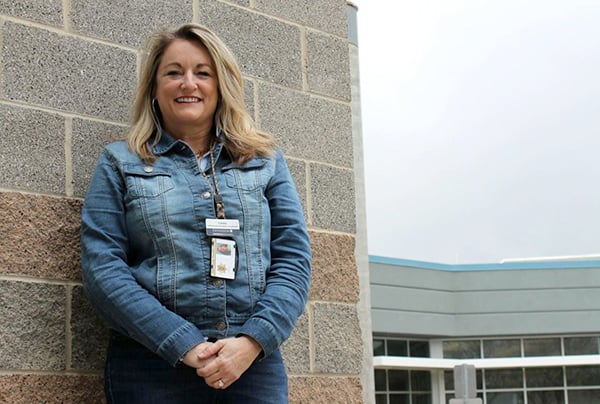
Posted: 04/16/2019
Posted by National Fatherhood Initiative®
For most of her childhood, Linda Donaldson (pictured above) said she watched her alcoholic father spend time in and out of jail.
She visited him once at a halfway house, but she always wished he could have known how much she loved him.
“I don’t know if he ever knew how much his involvement in our life, sober, impacted us,” she said.
As a volunteer teacher at the Utah County Jail, she noticed almost all of the men struggle with the same problem as her father.
Many incarcerated men do not know how to form meaningful connections with their families, particularly their children, she explained.
“There is a lot of heartache,” Donaldson said. “They have almost given up because they don’t have the tools they need.”
To teach fathers how to connect with their children, she helped establish the program InsideOut Dad® at the Utah County Jail.
“It can be a very rewarding experience. Where else do we get this kind of time set aside to be able to work on ourselves?” Donaldson said.
The InsideOut Dad® program was created by the National Fatherhood Initiative® to teach incarcerated fathers how to connect to their families. The program provides a free workbook with lessons on how to show and handle feelings, taking care of physical and mental health and what it means to be a man.
Before starting the six-week program, Donaldson received extensive training through Healthy Relationships Utah, a Utah State University Extension program. The program is available through the university extension.
She then met with 15 men at the jail for two hours a week to teach them different ways to build a relationship with their children.
“When I ask them ‘What is the No. 1 thing that you want for your child?’ a lot of times, they will say ‘honesty’ or ‘not to repeat the mistakes they’ve made,’” Donaldson said.
She shared a story about one inmate who was heartbroken because he had no idea how to connect with his three children. But after taking the course, the man memorized a fatherhood pledge in English and Spanish and swore to be “an involved, responsible and committed father.”
“The smiles on their faces are pretty rewarding,” Donaldson said. “I would like to see every father who is here to go through the course.”
This isn’t the first time Donaldson has taught classes specifically for men. For 13 years, she taught safety driving courses to truck drivers. She has also volunteered to teach transition classes at the Utah State Prison.
“I’ve seen what they’ve gone through by working in the jails and prison. I want to give back and help them see their value,” she said.
When fathers are absent from their homes, children are more likely to face abuse or neglect, struggle with behavioral problems, commit crimes, go to prison or abuse drugs and alcohol, according to statistics from the National Fatherhood Initiative.
Children are twice as likely to drop out from high school, suffer from obesity, end up in poverty and girls are seven times more likely to become pregnant as teenagers.
But if fathers want to build relationships with their children, Donaldson said it is also essential for men to build relationships with the “gatekeeper” of the child, who is often the mother in charge of protecting her children.
“There’s a push for fathers to recognize their importance in their family and children’s lives,” she explained. “If you want to connect with your child, you have to have a healthy relationship with the mother of the child.”
The program also teaches different types of parenting styles as well as the stages of child development. Another emphasis is how to co-parent and set specific goals on how to raise a child.
Some of the men in the program were expectant fathers or uncles who wanted to be more present in the lives of the children in their family.
“I get to show them how important they are and that caring for themselves and making a connection to their children can make a difference for generations,” Donaldson said.
 Ashley Stilson covers crime, courts and breaking news for the Daily Herald in Provo, Utah. This article was originally posted on April 11th, 2019 at heraldextra.com and is reposted here with permission from the Daily Herald.
Ashley Stilson covers crime, courts and breaking news for the Daily Herald in Provo, Utah. This article was originally posted on April 11th, 2019 at heraldextra.com and is reposted here with permission from the Daily Herald.
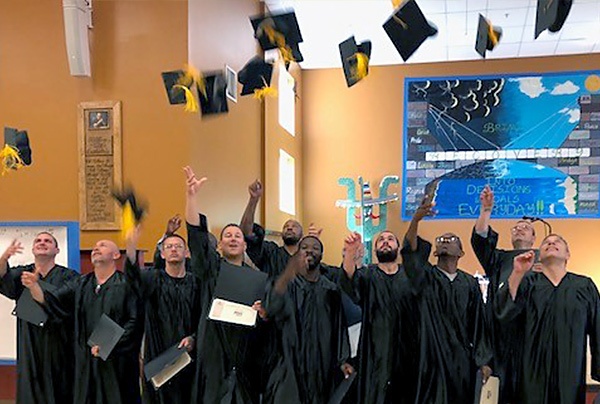
Posted: 04/16/2019
By Melissa Steward
“When I first started the [InsideOut Dad®] program, I figured I was too old to get anything from it because both of my children are now adults. I was wrong. This program taught me things about myself that I’d kept suppressed. Mainly it assisted me with building a loving relationship with my son and daughter who had all this time yearned for the humility and honesty that comes from being a father no matter what age. I learned that my children still needed and wanted their dad. Mr. Cage made his lessons instructed, open, and fun. I truly owe a lot to what InsideOut Dad® taught [me].” – Operation New Hope Client, CJ
I recently had the pleasure of speaking with two gentlemen from Operation New Hope located in Jacksonville, FL: Curtis Hazel, Community Engagement Director and Ronnie Cage, Fatherhood Initiative Coordinator and InsideOut Dad® Facilitator, who are having great results combining InsideOut Dad® for incarcerated fathers with their Ready4Work® program upon those fathers’ release.
Operation New Hope provides support, life and job skills training for people with a history of involvement with the criminal justice system, and places them in employment that offers a sustainable quality of life. Their vision is to build a stronger community by creating opportunities to realize second chances and reduce recidivism. Operation New Hope runs National Fatherhood Initiative’s InsideOut Dad® program for incarcerated fathers at the Baker Correctional Institution, Montgomery Correctional Center, and through the Work Release Program at Bridges of America.
After fathers complete InsideOut Dad® and are released, Operation New Hope recruits the same individuals to their Ready4Work® program, a 4-week life and job skills training program to help them get back on their feet after they are released. The program offers clients housing assistance, case management, job coaching, vocational skills, and soft skills. About 10-15% of the dads who go through InsideOut Dad® go through Ready4Work® (dependent on release city and ability to access the program). They’ve graduated 350-375 fathers from InsideOut Dad™ since 2014.
I asked Ronnie what he liked most about the InsideOut Dad® program and he said “the fathering handbooks”. The dads love them since they get to call it their own and write down their thoughts. He also says that is makes it “more real” for the guys since they can follow along. He loves that the topics are “so on point with what men and fathers deal with” and also how the program fits together in just the right order. “Some subjects you just don’t talk about (like co-parenting) until you’ve addressed other subjects (i.e. family history and what it means to be a man) which gives the program a great flow.”
While Ronnie and the dads love the fathering handbook, what the dads might love more is Ronnie himself. At NFI we’ve always said that the facilitator makes the program, and that can’t be any closer to the truth than with the programs Ronnie facilitates. Back when Ronnie began running InsideOut Dad® at Baker Correctional, there were only 17 guys in the first class, and maybe 12 or 13 in the next. But one inmate loved the class so much, that he became the recruiter for InsideOut Dad® in his facility – and Ronnie didn’t have to recruit anyone after that. Now a days, the inmates always say that they heard about the class from another inmate. “It has street cred” so to speak, and the inmates love it because of what the curriculum brings and how Ronnie teaches it.
Ronnie’s tips for being a great facilitator and relating to the guys?
“Being raw and keeping it 100. You have to be real. These guys see right through phony”, he says. You have to believe in the curriculum enough to be able to say, ‘everything I am sharing with you is the correct way to do these things…but at the same time, what I’m sharing is going to make you uncover some things you don’t want to uncover’.
Further, Ronnie knows when to use the program facilitator’s manual, when to deviate from the session, and when to bring the conversation back in. “You have to be able to explain and talk about fatherhood to a guy who hasn’t been a good father, who lacks skills, and be real enough to make him be able to see it on his own. You’ve got to spoon feed the guys. You have to be able to share this info with a guy for him to walk away and say, ‘maybe I’m mad at first’, then say, ‘wow, I needed to hear that’.” One inmate told Ronnie, “I was mad at you the first week [about what was shared in the session], but you were exactly right!”
What Ronnie loves the most is seeing “a light bulb” that goes off for the guys – and their barriers come down. They immediately begin using the skill they've learned on the kiosks back in their cells to talk with their family. He hears about dads and moms getting along better because dad’s communicating better and using the information he learned right away.
To close out the programs at the facilities, they always do an official cap and gown ceremony with graduation music. The Warden makes a speech, the Chaplin speaks, Ronnie shares some funny and memorable moments from the session, and the dads get their picture taken with their InsideOut Dad™ graduation certificate. Closing with the official ceremony also helps to “make it real” for the dads. Ronnie wants to make it real all the way through to the end.
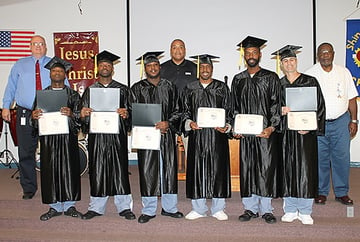 |
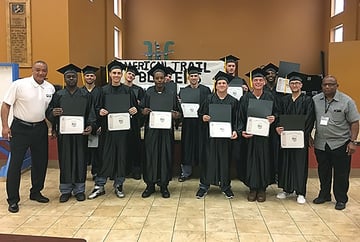 |
| Chaplain James Keffer (back left), Ronnie Cage (back center), and Chaplain Aaron Hobley (back right) with the October 5th, 2017 InsideOut Dad® Graduating Class at Baker Correctional Institution. | Ronnie Cage (far left) and Chaplain Robert Brown (far right) with February 6th, 2018 InsideOut Dad® Graduating Class at Bridges of America. |
Ronnie looks at his work as planting the seed, but realizes that he can’t plant the seed, water it, AND watch it grow all the way. The dads have to take what they’ve learned and do the work after release. In fact, some of the most touching feedback Ronnie has received was a text from a guy whose son took Ronnie’s class two cycles ago at Baker Correctional. The text said, “I was at Baker on Saturday to see my son and he told me you helped him a lot, I wanted to say thanks my friend”. Ronnie knows there’s so much “more” in that text than is being said – the class participant and his own dad have been talking. “This kind of work with fathers is about their own father, and their grandfather – because often there’s been possibly more than two generations of dysfunctionality.”
Ronnie’s favorite InsideOut Dad® sessions:
NFI sincerely thanks Operation New Hope, Curtis Hazel, and Ronnie Cage for their work rehabilitating fathers and helping to connect them with their children, heart to heart. And not only that, helping to keep those dads out of jail or prison and present in the lives of their children. We couldn’t ask for anything more.
To learn more about Operation New Hope, visit www.operationnewhope.org.
To learn more about InsideOut Dad®, visit www.fatherhood.org/iod.

Posted: 02/21/2018
By Ave Mulhern
I love the saying by Zig Ziglar, “Success occurs when preparation meets opportunity”. It was a mantra for my kids when they were younger and participated in various sports. With seemingly endless practice sessions, there was always that sweet reward when they succeeded in a touchdown or beat a swimming record in breaststroke. Ironically, this saying came to mind recently when I connected with a pregnancy center who purchased NFI’s Inside Out Dad® curriculum (a program that is typically used in correctional facilities for incarcerated dads).
When I reached out to learn more, I met the Director of Client Services, Michele Cheresnick at Choices Pregnancy Center in Chattanooga, TN. They work to empower, educate, and support women facing a pregnancy decision. Michele shared that research states that half of abortion-minded women choose abortion because they did not want to be a single parent or were having problems with husband or partner*. For that reason, Michele wanted their center to offer a vibrant men’s ministry to help dads understand the important role they play as a father. Not knowing what that would look like she just prayed. Soon after, Choices PRC brought on Jonathan Hoover as their Director of Men’s Ministry. Jonathan jumped right in and got to work.
Here's how that looked for this pregnancy center.
To get the ball rolling, Choices invested in Jonathan attending the annual Care-net Conference to learn what other centers with a similar mission are doing in general, and with fathers specifically. It was there that he met Steve Longenecker, Assistant Director of Programming, and Shaun Barnes, Men’s Services Coordinator with Sav-A-Life Pregnancy Resource Center in Birmingham, AL. Their center has a long-standing history of serving fathers exceptionally both in the center and out in the community.
This sparked an idea within Jonathan that they need to not only reach within their center, but reach out, too. While he began to work in this direction, it just so happened that a nearby prison’s Director of Reentry was searching the internet for a community partner who could help dads who were soon to be released from prison reconnect with their child(ren) and families. She found that Choices PRC had services for Men & Partners listed on their website– and as Zig Ziglar once quoted, “Success occurs when preparation meets opportunity”.
The result? Starting in February, Jonathan and another volunteer begin delivering NFI’s InsideOut Dad® as a pilot program to a select group of dads who will soon be released from prison!
While the story of how Choices PRC got here is interesting, there are several steps that both Choices, Sav-A-Life, and other successful pregnancy centers have taken to position fatherhood services from the back and into the front of their services:
To learn more about fatherhood programs and being ‘prepared’ to work with fathers:
For more information on NFI Inside Out Dad and other resources at www.fatherhood.org.
*Finer LB et al., Reasons U.S. women have abortions: quantitative and qualitative perspectives, Perspectives on Sexual and Reproductive Health, 2005, 37(3):110–118, doi:10.1363/3711005.
.png?width=600&name=NFI_Blog_common_graduation%20(2).png)
Posted: 03/20/2018
Posted by National Fatherhood Initiative®
“She’s so beautiful” are words Arthur Bess repeated upon seeing his six-month-old daughter for the first time.
Bess and two other inmates, wearing shirts that said “24/7 dad,” were greeted by their kids and family members to celebrate their completion of the InsideOut Dad® program at the Madison County Penal Farm.
“This was actually his first time seeing and holding her, so I was very excited about that,” Bess’ girlfriend Tericca Lenon said. “The kids miss him, I miss him and … I feel like the program was a very good job.”
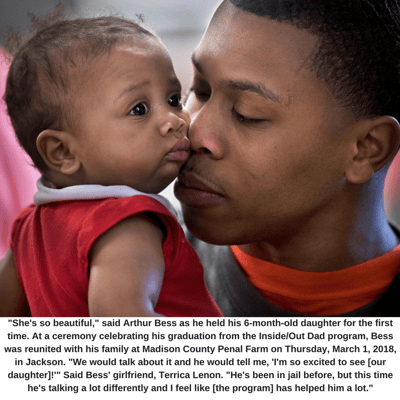
InsideOut Dad® is a curriculum from the Maryland based National Fatherhood Initiative, Southwest Human Resources Re-entry Coordinator Tim Carothers said.
The class helps men become better fathers and spouses while reducing the recidivism rate in Madison County.
“They’re intelligent people,” Carothers said. “They just made some bad choices. What we try to do is give them a sense of purpose.”
Ryan Mills has been in and out of jail since he was 17 years old. Out of all the time he has served over the years, the 14 week Inside/Out Dad® program has made the most change in his life, he said.
When asked if he’d like to participate in a dad program he was all-in, and once he found out the extent of the class, he was even more excited.
The men made résumés, learned how to answer interview questions, how their thoughts influence their feelings and actions, and how to control them, among other things, to prepare them for life outside jail.
Transitioning out of jail is hard, he noted. In the past, he’s fallen right back into his old ways by returning to the streets to make money. With these new resources, Mills knows this time will be different.
Different for him and especially his kids.
“All they know is me being bad, so now they see me doing good,” Mills said. “Hopefully, it inspires them.”
Lenon can see the same change in Bess, who has also been in and out of jail. This time is different, she added. When he gets out in June she is expecting him to do better on all fronts — because this time he actually wants to.
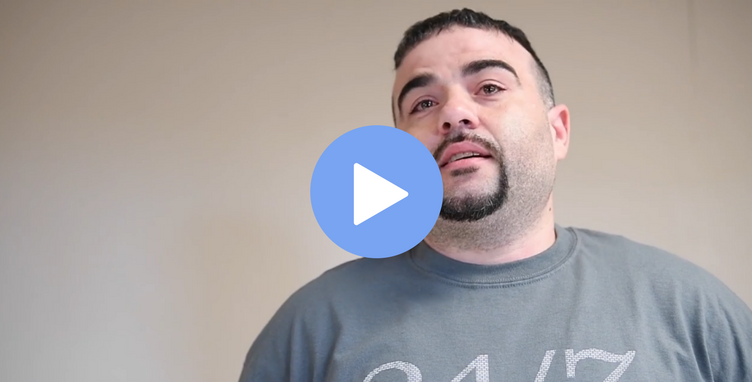 InsideOut Dad® graduates reflect on the program at their graduation ceremony on March 1, 2018, at Madison County Penal Farm.
InsideOut Dad® graduates reflect on the program at their graduation ceremony on March 1, 2018, at Madison County Penal Farm.
Everyone wins
It costs the county about $40,000 a year to house an inmate. Any program that helps reduce recidivism benefits the inmate and the taxpayers.
Consequently, the program was created to help offset costs, Southwest Human Resource Agency Executive Director Mike Smith said.
Out of the 125 men who have completed the program in the southwestern region of the state, only eight have gone back to jail, which is less than 10 percent, Smith added.
With Madison County having a higher recidivism rate than the national average, at about 82 percent, Madison County Mayor Jimmy Harris said programs like InsideOut Dad® are crucial.
The national average is about 66 percent, Smith noted.
“I’m really appreciating this class,” Mills’ mother Tina Crowder said. “I didn’t know anything about it, and I hope people take advantage of it, and use it for doing good.”
This article was reposted with permission from The Jackson Sun.
Photo and video credit to Morgan Timms/The Jackson Sun
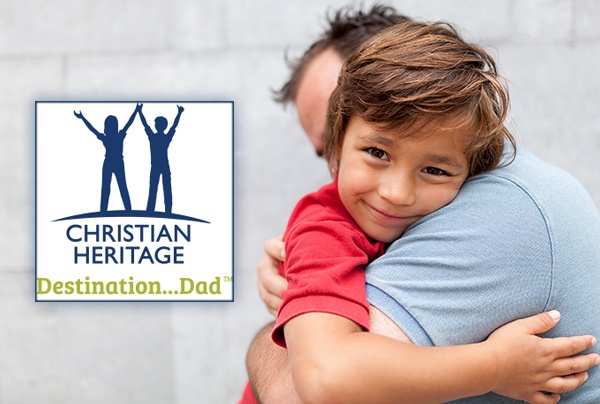
Posted: 08/30/2018
By Ave Mulhern
Several years ago, in a site visit to a Milwaukee Jail, I sat in on a fathers’ group and heard a father complain fervently that he had been excluded from an important school meeting involving his son. Good for him because he knew his incarceration did not negate his role as a parent. He claimed “I am still my son’s father!” but he had no say in his son’s future, and his son lost out on his father’s input. He wanted to be “Inside”.
In contrast, I often hear of fathers who just give up on their relationship with their child because of a number of barriers; incarceration, fractured relationship with the mom, lack of skills, financial woes, etc. I recently heard an incarcerated dad, when asked if he would like to join an InsideOut Dad® fatherhood program and try reconnecting with his child and family and he said “no, why would I? I don’t want to burden them with me.” Sadly, he thinks he is replaceable. He wanted to be “Outside”.
In this post, I want to highlight an exemplary organization that is addressing both of these scenarios, as well as the holistic reach it has not only inside of the correction facilities, but outside to the families of the incarcerated as well.
Destination Dads™ is a program launched in 2009 by Christian Heritage of Walton, Nebraska. I recently conducted an informal interview with Christian Heritage’s Family Outreach Program Supervisor, Larry Crippen, who oversees the Destination Dads™ program and its partnerships. (Larry also shared their 2018 Destination Dad™ Program Summary with me which clearly communicates what they do, why they do it, how they do it, and what their future goals are—a great sustainability tool).
Destination Dads™ uses NFI’s InsideOut Dad® curriculum as the gateway program for incarcerated fathers to start understanding their irreplaceable role in their child’s life and how to pursue it—whether they are inside of jail or prison—or out.
During our interview, I asked Larry to share his best tips that has led to their continued success in corrections and reentry work.
In closing, I hope these tips are helpful to your work with fathers. Whether the dads you work with are incarcerated or not, it's crucial for them to not stand on the outside of their child’s life but, that they learn from the start, the irreplaceable role they play inside the life of their child!
For more information on InsideOut Dad® and Christian Heritage, go to http://www.chne.org/who_we_are/
Posted: 01/12/2017
By Melissa Steward
We try to spotlight fatherhood programs in the news when we can. We do this for many reasons, but one is to encourage you. We want you to know that you are not alone.
You'll see in this post, there are men like Darnell W. Parker Sr. out there serving alongside you. We are with you. Be inspired to keep doing the good work of serving fathers and families.
This group at the New Hampton Jail, along with the Hampton Sheriff's Office, is doing great work.
We talk about the father absence crisis in America and the challenge of Fathers Behind Bars, but the Daily Press recently featured a New Hampton Jail running InsideOut Dad® and we had to share it.
New Hampton Jail is serving the incarcerated fathers who are learning how to be better dads using NFI's InsideOut Dad® program, which teaches incarcerated fathers the parenting skills they need—that some dads have never received. It teaches fathers the importance of ‘being there’ for their children.
It's a 12-week program, with sessions about self-awareness, dealing with family history, child development, how to discipline, handling emotions, and handling relationships with their child’s mother. Darnell W. Parker Sr. recently stood in front of a group of incarcerated fathers at the Hampton City Jail to help prepare the men for eventual release.
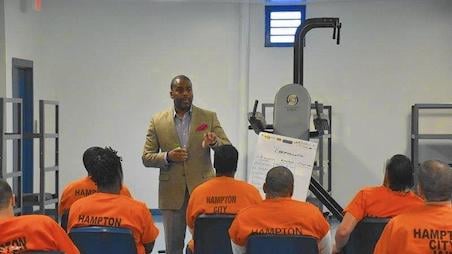
Darnell W. Parker Sr. leads NFI's InsideOut Dad® program for incarcerated fathers at the Hampton City Jail, part of a re-entry initiative by the Hampton Sheriff's Office.
Parker told the group of dads, "You are superheroes in your child's life, whether you know it or not." Parker runs the InsideOut Dad® program and leads a Hampton-based therapy group focused on children and adolescents. Parker is a great example as he volunteers for the program in the jail.
Speaking of the program, Hampton Sheriff B.J. Roberts says, "It's awesome to have these people come inside the jail and work with the people inside the jail so we can prepare them to come back outside...if you have the ability to do training and counseling and bring in people who really appreciate the fact that these guys are coming back into your community, good things can happen."
"Once they go back out into society, they go back to their old surroundings, old people, and it's easy to fall back into their old ways — and then they come right back," says Melissa E. Jenkins, the programs coordinator for the Hampton Sheriff's Office, "That's what we're aiming to reduce".
You have to read the full post in the Daily Press to learn about the great initiative called "Ready, Set, Go" with plans to bring together over 30 different community organizations to help fathers and families. Here are just a few partners to give you an idea:
I am greatly encouraged by the work Mr. Parker and the Hampton community is doing. Imagine your community serving incarcerated fathers like this. What would have to change? What would be the result?
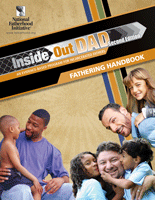
InsideOut Dad® is the nation's only evidence-based fatherhood program designed specifically for incarcerated fathers.






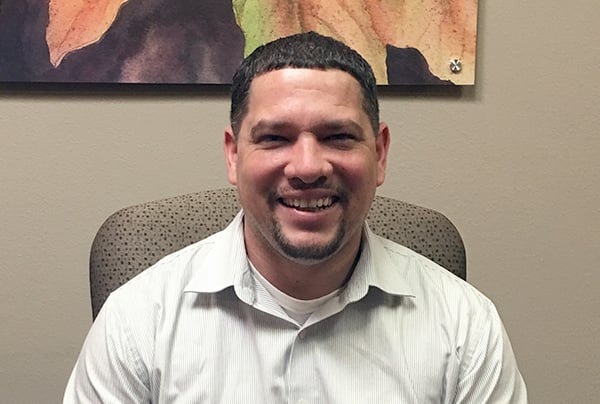
Posted: 06/19/2019
By Melissa Steward
As we continue celebrate 25 years of NFI and our focus on fatherhood practitioners doing excellent work with dads, we turn our attention to Angel Flores with Vista Community Clinic in Vista, CA.
Vista is located in the San Diego area, and one of the first things Angel told me is that San Diego alone has the same population as 22 states. That’s a lot of dads to serve!
So, let’s dive in to hear how Angel came to be in this position, a little about VCC and his background, and how he’s made the Dads Club Program at VCC a success.
“Previously I worked with a non-profit community resource organization and after that as a case manager. I always kept great contacts in my community so I could network to help the families I served. In 2016, VCC received the Federal Government’s responsible fatherhood grant and that’s when Sylvia Alcantar, the MCH Program Manager reached out to me to see if I wanted to come work with dads as a Program Supervisor for the Dads Club. I will tell you more about myself in a bit, but I was very interested in the position because I wanted to show my voice in a service that wasn’t really out there for dads in our area.
What was unique about this opportunity with VCC was that we would be implementing the fatherhood program basically from scratch to serve all types of fathers, both English and Spanish-speaking. With my background in case management, I knew it would be a very important component for a successful program. I also knew that I would really need to leverage my community contacts and get direct referrals.”
“I was a teen dad and there weren’t a lot of services for us then, I was also still living with my mom at the beginning. But eventually I became a self-sufficient teen dad, I worked two jobs while the mother of my child finished school. I remember having two sets of friends, the ones facing a lot of challenges in life, and ones looking for a way out—entrepreneurs. Just when I was trying to identify my direction, I heard Oprah say, ‘I’ll show you your future if you show me your friends’. So, I decided to spend more time with the entrepreneurial friends and that helped guide me in the right direction, to want a career, go to college, etc.
“Continuing with the idea of leveraging my contacts, I knew that I would need to campaign for direct referrals, and that required physically getting out into the community to make personal connections with agencies. And in order to keep the referrals coming, I needed more than a verbal agreement, I needed MOU’s to formalize our agreements.
So, I assigned each of my staff the job of going out to visit a total of 22 agencies—some meetings were prescheduled while others were just a drop-in. The goal for each staffer was to introduce themselves, share info on VCC and our fatherhood program, ask for a tour (if the agency was willing – and surprisingly, many were), learn about their intake process, and ask how we could formalize an agreement. It worked! To date we have close to 30 MOUs with community partner agencies.
We also went to the courthouse and got listed in their directory for parenting programs under “D” for Dad’s Club. That helped make it easy for dads to find us.
Also, we heavily promoted our list of services (not just the Dads Club) focused on things dads need help on:
Since coming on board with the Dads Club, we’ve served over 670 dads in the San Diego area!”
“That no matter what’s happening financially or with himself, or around him, at the end of the day, dads should still focus on whatever it takes to be in their child’s life.
Some dads are grieving that loss of being in their child’s life, but they also have unrealistic custody expectations. I usually get the dad talking about the love he has for his child. I always ask him to tell me a story of what life would look like if they could wave a magic wand and have it be the way that he wants. Usually, the guys break down and share more, I encourage them that it’s attainable, and that we’ll work together to get there.
“We’ve had lots of success stories. In fact, each quarter, our case workers are required to give a success story from a client they work with. We see dads that are able to reconnect with their child, get housing, employment, and feel like themselves; they become self-sufficient. In fact, these dads come back to share their stories with the Dads Club. In some cases, the dads are not successful, but they share their setbacks which lets the other guys know there will be hiccups…but there’s hope.”
“I would suggest using a similar approach to ours for a successful fatherhood program:
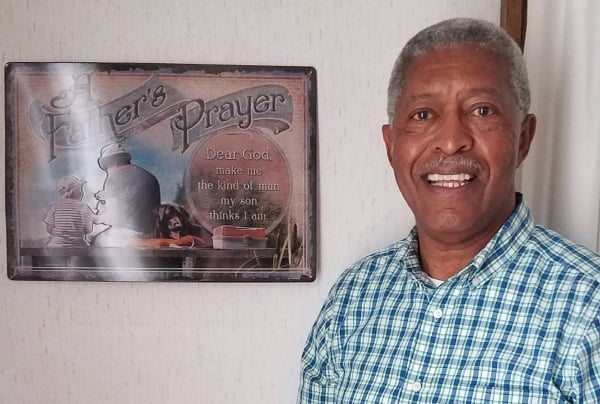
Posted: 06/26/2019
By Jacqueline Hannan
In our final posting to celebrate 25 years of NFI, we look to an amazing program that combines community events for dads with almost every program that NFI offers—The Coshocton County Fatherhood Initiative (CCFI) and Mr. William Johnson.
While William's role at CCFI could be a full time job, it's not actually his full time job. Nonetheless, he gives everything he has to help fathers with their needs and make them better dads. I was able to catch up with this fatherhood champion (just barely!) to learn about his time at CCFI and the myriad of programs they offer dads.
"CCFI is a special sub-committee of the Coshocton County Family & Child 1st Council. Our mission is to strengthen the family unit through engaging and empowering fathers and father figures to be meaningfully involved in and committed to their child’s well-being.
We live and work in 'Rural America'. Coshocton County has 37K residents, and their work consists mostly of the farming industry. Although we’re a small community, we have the same struggles as urban communities. Drugs, father absence, job issues, and the opioid crisis are among some of the struggles we have.
The good news is that our community has taken an active role in trying to erase father absence. In fact, at Coshocton open houses and other events, we pass out white “gummy erasers” that have a green logo that says “Helping to Erase Father Absence”. We’re also fortunate that the local Court System is very proactive in positive father involvement. They give referrals for dads for fatherhood programs.
I began at Coshocton County Fatherhood Initiative in 2006 as a Program Facilitator and Coordinator of workshops. After a period of time I became the Co-Chairman, but still remain in the aforementioned role."
"In general, we serve dads by providing workshops, programs and events. We focus on education for dads and the prevention of fathers being absent.
To accomplish this, we run several NFI programs, as well as two CCFI-specific workshops:
Most importantly, we also host a lot of events that help connect us with dads. Fathers will buy into activities, but not necessarily programs. By getting dads to events, we can connect with them and follow up to get them in for our programs.
We host an annual All Pro Dads Breakfast Program with the local schools,Father’s Day Pool Party, Party in the Park for Dads & Families, and a Dads Alumni Event for past 24/7 Dad® Participants to come together to discuss their progress and success since completing the program."
"What’s most important is consistency and involvement in their children’s lives. Learning to become nurturers as well as “gatherers”, and to take on more responsibilities. Typically, mom is the nurturer and the dad is the provider, or gatherer. However, in these times the moms work too. If the dad is a non-custodial dad, he needs to be everything he can be as a parent.
Telling his children that he loves them is also very important. Taking on more responsibilities and telling your children that you love them—those things do not cost money. Fathers need to understand that no matter what the circumstance, they need to make sure that their children know they can come to them for support and love, always."
"There were 2 dads that stand out in my mind – one came to 24/7 Dad® with no court order and one came with a court order in order to have visitation of his daughter. Both were non-custodial dads.
The first dad, who did not have a court order, came in through Coshocton’s Foundations Workshop. He came with his very 1st child. He then took 24/7 Dad® AM 4 times and brought another dad with him each time! He now has shared parenting with his daughter.
The second dad, who was court ordered, had supervised visitations with his daughter. He completed the 24/7 Dad® Program as part of his case plan and now has full custody of his daughter.
Also, both men have gotten better jobs since completing the program."
"It takes a while to develop a fatherhood initiative and fatherhood programming. We’ve been successful because of NFI’s programs and resources. NFI has, in my opinion, the nation’s best technical support to help programs change fathers’ lives. Their staff always has time to talk with us and guide us in the right direction.”
-----
This concludes our blog series featuring Fatherhood Champions who are making a difference with dads. Thank you for joining us to applaud these great practitioners in the fatherhood field.
For more information on NFI and our mission, please visit Our Mission page.
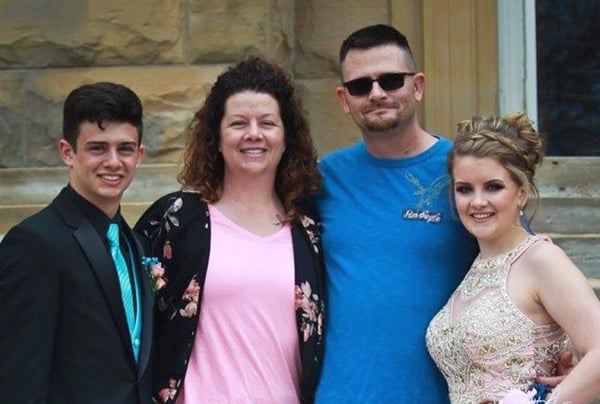
Husband: John Persons; Son: Brandon Persons and Daughter: Madalyn Persons
Posted: 06/12/2019
By Erik Vecere
To celebrate National Fatherhood Initiative®’s (NFI’s) 25th Anniversary, I want to introduce you to Sara Persons, a “fatherhood champion” who has been an amazing partner of ours for many years.
Sara is a program supervisor at Children and Families of Iowa (CFI), which provides a broad spectrum of family engagement work (e.g. therapy, substance abuse, tracking & monitoring, child care, domestic violence, risk & permanency services). She oversees the Iowa Parent Partner Program (PPP), a contract with the Iowa Department of Human Services that covers all 99 counties throughout the state.
Sara has spearheaded work to recruit fathers and provide father-specific services and resources as part of the PPP. She connected with NFI when she had staff research programs and curricula who, then, recommended that they use NFI’s 24/7 Dad® program. Her agency was later approached to do work with incarcerated dads, which they also decided to use 24/7 Dad® for because the facility they were working with was considered a “release-type” prison where men would be released within a year and could continue 24/7 Dad® once they were released.
I had the opportunity to talk to Sara and dig deeper into her personal passion for fatherhood work and some of the successes and challenges she’s faced over the years.
“I started with CFI in 2005 doing in-home, part-time work since I had two kids at home. From there, I went fulltime, which eventually led to a supervisor role. In 2007, the state started to roll out the PPP and my agency bid for a two-county contract and got it in 2008. I started as the parent partner coordinator for two local sites, which expanded over two years to eight counties and then a state contract was put out in 2013. That’s when CFI received the state contract and I was promoted to the state coordinator position.”
“I grew up in a middle-class home with both of my parents who were married. I didn’t really know that my life wasn’t normal, but at the same time it was normal because my father was an alcoholic. He committed suicide in 2002 at the hand of his addiction. I was in college at the time and he committed suicide the Friday before my senior finals. I knew nothing about addiction at that time. I knew nothing about child welfare or about any of that world. Through his death, I learned there was a treatment facility in our town that we had grown up in; it was a small town in Colorado. I had no idea, I just knew what I saw on TV: you just got on a plane and went away for 30 days; you got better; you came home. I was very ignorant to addiction and how it impacted families. I had decided, then, that I was going to learn more about it and how I could help families and children so they don’t have to go through what I did.”
“This is a relatively rural area of Iowa and through our fatherhood programming and our Wapello County Fatherhood Initiative (which is still going strong six years later), we’re still holding fatherhood events, being more aware of the father role, and encouraging dads to be more involved. Our work with the Department of Human Services (DHS) is showing more and more dads whose children are being placed with the dads.
24/7 Dad® has always been our biggest group, whether they’re DHS involved, Department of Corrections (DOC) involved, or just members of the community. It’s a great mix of community that comes together and support one another during the fatherhood events.
I think people are starting to realize that dads should be involved. We had one specific member of our Wapello County Fatherhood Initiative who shared the following story: she had a child who was having outpatient surgery. When she and her husband went to check the child in, the nurse was looking at, and directing all conversation, towards mom. And because she was more self-aware, being a part of this initiative, she just stopped talking and turned around to start playing with their kid, so that the nurse had to engage dad in the standard questions about the child. It was automatic that the nurse was just engaging mom… and dad wasn’t a part of the conversation. I think bringing self-awareness has a ripple effect.”
“Generationally and historically, I think we know moms have been a big player in their children’s life and typically deferred to as the nurturer and the one that keeps the family together. But, dads need to know that they are just as important and their children need them. Just as they need mom, they need dad to show up for sporting events, Christmas concerts, or anything they’re involved in.”
“Yes, we are using it both in the prison and in the community. We’ve always had peer-led groups who are dads that have graduated from the program. We did a Spanish-speaking 24/7 Dad® peer-led class once in partnership with our local community college and paired up the peer facilitator with one of the college’s professors.
We currently have five 24/7 Dad® groups going in 11 counties. We will run the 12-week program in one county and then move it to a different county for another 12 weeks.
In those places where we run the 24/7 Dad® groups, we also offer NFI’s Understanding Dad® program for moms. We really want to engage mom and dad. Through one of our contracts we’re able to provide child care and gas cards so there’s some incentive that takes away some of those barriers that prevent mom and dad to attend the groups at the same time. Sometimes a mom will encourage the dad to go to 24/7 Dad® while she’s at Understanding Dad®. Sometimes dad will be the one to let the mom know there is a group for her. These programs are recognized by DHS and our local courts, so they are well supported.”
“They’re not parenting programs where the parents come (in either group) and are preached to. They’re really about evaluating their own self, their own parenting skills, their own childhood and collectively, as a group, asking, ‘Is that best practice? Is that what’s best for my family? Did I learn something earlier in life that maybe isn’t the best way?’ They’re able to get feedback from the whole group. So, it’s not just somebody sitting there talking to them for 12 weeks, but instead, it’s very interactive. I really like that piece of it.
We have dads who complete an evaluation at the end of the program and say, ‘I got to hear some ideas from things that other dads were doing that I hadn’t ever thought about.’ That peer support piece is great.”
“Dads will reach out and say things like, ‘things are going great, I’m back in my kid’s life,’ or ‘if it wasn’t for this group I wouldn’t have addressed unhealthy areas.’” Our fatherhood coordinator started as a participant in 24/7 Dad® when he was incarcerated and was trying to parent, knowing he would need to do everything differently when he got out. He stayed connected to 24/7 Dad® because he knew if he kept his kids at the forefront, that would be his motivation to change. And he went through a lot of changes. At the end of his story, his is now a single dad with both of his daughters living with him.”
“You have to meet the dad where he’s at and you have to empower him because those types of skills are life-long. Dads parent their children the way they were parented. Sometimes, they don’t realize things are good, bad, or indifferent until they’re able to have that ‘a-ha’ moment through conversations and peer learning…and it takes longer than 12 weeks. When you encourage and empower dads, good things start to happen.”
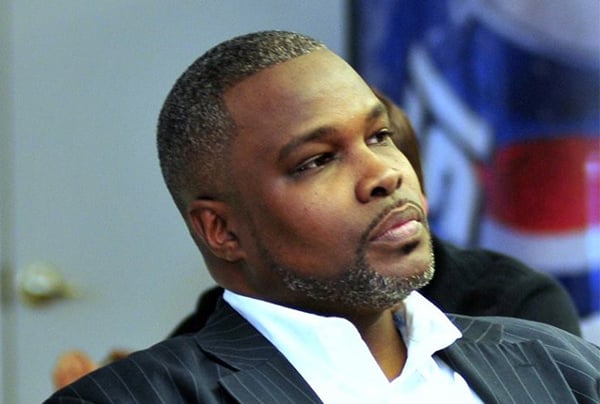
Posted: 06/05/2019
By Ave Mulhern
As we continue to celebrate fatherhood champions doing excellent work in honor of NFI’s 25th Anniversary, we turn our focus to David Cozart of Lexington Leadership Foundation located in Lexington, Kentucky.
Lexington Leadership Foundation (LLF) is an umbrella organization serving families through serving children within In-School and After-School programs, Athletics, the AMACHI program, mentoring, summer enhancement and Urban Impact. LLF does this through a 3-prong approach: Engaging people of faith and good will to address issues, building capacity in others, and developing joint initiatives.
I recently met with David to learn about his role with LLF, what brought him into this position, and to hear some of the most inspirational father stories and successes he’s had working with dads. David is one inspirational leader—he was even honored on the Today Show!
"My role at LLF as Fatherhood Initiative Director is to enlist our 3-prong method to address fathers in order to restore, equip, and deploy men back into the family and into the community at large. I provide oversight to many volunteers and with 2 staff; an administrator and a Fatherhood Initiative Coordinator, Lee Shephard. Lee delivers curriculum around responsible fatherhood throughout the community. I have been here in this role for 7 years, but have spent a total of 20 years in fatherhood implanting fatherhood into other spaces. I work with the state agencies, officials, and service providers to increase the capacity for fatherhood programming and awareness raising across the Commonwealth of Kentucky, statewide. We are currently drafting a statewide strategic plan for Kentucky Fatherhood."
"Life circumstances are parallel to my vocation. After my undergrad, as a young single man, I became a counselor at Job Corps working with young men. Then, while still single, I came to Lexington as Assistant Director for a home for unwed mothers. During that time, I became a father (out of wedlock) to two sons, with different mothers, who were born in the same year. Although these circumstances were disappointing and less than desirable, my children certainly were not. I was determined to be present and positive in their lives."
"Later down the road I become a Certified Community Organizer while working with grassroots community agencies. I later served at the Lexington Urban League. I took fatherhood to each place I worked. There was a deficiency of male role models, so if you got me - you got fatherhood. Before working at LLF I was on their board, and they applied for, and received a Federal Responsible Fatherhood Grant. It was then that they invited me to oversee the grant and I accepted the role as Director. While we don’t have that particular grant at this time, our fatherhood work continues."
"I always had my father in the home, and we were a blended family. Both my dad and mom were hard working and they were always there. Both are deceased now but I saw how he worked and modeled his faith. We had 6 in the family, 4 were older and 1 younger sibling, all step siblings but we never felt like step children. Our home was a refuge, and in retrospect, I knew kids who grew up without a father in the home, or were disconnected, and they were very attracted to our family. We always threw on some more food at dinner, etc. Those elements of growing up with openness of both father and mother were a big influence on my life."
"If you watch the piece about me on the Today Show, you will learn that I had 2 children out of wedlock on May 23 and 26 the same year. My mother and father walked with me through that. I acknowledged that I was going to be a father, and I fared well out of all that. I was both custodial and non-custodial, have been in child support court, dealt with meeting obligations, tension of my marriage and other kids, explaining to my children… you name it! There is no scenario I have not walked through, so it makes for good connections with my cohorts."
"It would be for fathers to understand the absolute critical role the father pays in his child’s life in spite of the narrative society gives. NFI is excellent at messaging this. We are intentional at making the dads, cohorts, staff, facilitators, etc., aware of the father absence and involvement statistics. When you share those with the dads, they become aware of the importance of their role. I ask them in the end, ‘If your absence causes all this, then you are one important component when you add up all the stats. But if you flip it, how important are you if you being there reduced those negative stats?’ They see the positive IMPACT of being there and that is encouraging."
"I enjoy making BBQ and a good slab of ribs, starts with good meat. And a good roux is necessary for starting a gumbo. NFI programs are like good, raw meat, and good roux. Strong foundations are what I like most about it. The programs have a clear trajectory and a clear facilitator guide which is a great complement to the program, and it is set up perfectly to coincide with the fathering handbooks."
"I also like the way in which curriculum is laid out. I’m a firm believer that an internal check should be done first – so the dad looks internally in one of the first few 24/7 Dad® sessions at ‘What is a man?’ It also allows the dads to ask themselves, ‘what’s your story?’. It provokes them introspectively, and then progresses outward. It is a masterful layout. As a dad, you begin by looking in the mirror (at yourself, your history) then you look out the window (at your relationships). And finally, you look out through a telescope to envision and see what could be."
"A dad in the Inside Out Dad® program. Early on, we always gave out the certificates, on nice card stock with nice printing. When this dad completed the program and received his certificate at the graduation, he teared up. I wondered, ‘What’s going on?’ He said ‘This is the first thing I have ever completed’. I may as well have given him a robe, a cap, and a PhD."
"Another man, Andy (in the Today Show video) became like a brother to me. He started with 24/7 Dad® 7 years ago. As a cohort, trying to see his daughter, he did every single thing we offered. He got clean & sober, got a steady job, home, and he now has holidays with his daughter. He is a “resume” fatherhood story."
"I would say to start by getting access to the materials and resources NFI offer on their website. Then begin with collaborations! Start with the things that don’t need major infrastructure and make sure the people you are working with are equipped to understand the importance of responsible fatherhood. At LLF we say, ‘If you’re doing it long, you’re doing it wrong.’"
"There are also lots of 'agents' in the community that are, or could be, doing this work. I make it a practice to always ask, “What about the father?” I challenge everyone on that. CEO’s, Bankers, Human Services, Schools, health care providers… ‘When you’re doing your strategic plans, what about the fathers? When I am looking at the productivity in my factory, what about the fathers?' Challenge practitioners to carry that banner. It is the root cause of dysfunction that routes through our society and impacts every part. If we all see that, we can turn this ship around."
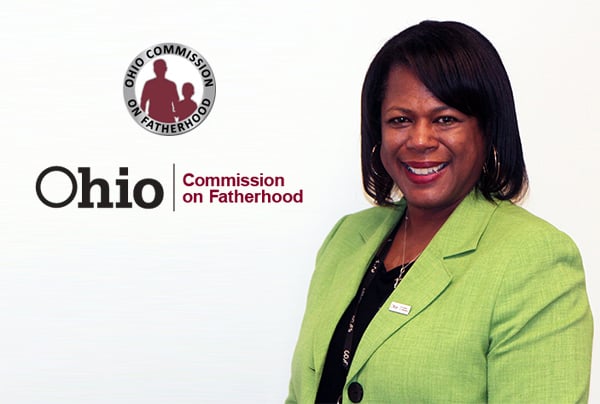
Posted: 05/28/2019
By Christopher A. Brown
I’ve seen many statewide fatherhood initiatives come and go in my two decades at National Fatherhood Initiative® (NFI). Most have lacked staying power.
The statewide initiative in Ohio is an exception. That's why when our staff made recommendations to identify fatherhood champions to feature during our 25th anniversary, the first person who popped into my mind was Executive Director Kim Dent of the Ohio Commission on Fatherhood (OCF). I’ve known Kim for many years. She’s one of the most committed fatherhood champions I’ve known. She’s a sought-after speaker on father involvement, especially when it comes to ways in which states can intentionally and proactively support serving fathers at the local level.
Recently I interviewed Kim to learn more about her background, her role with OCF, how OCF has partnered with NFI, and more. She had so much valuable information to share that it called for a two-part blog post. We’ll publish the second part later this week.
“I am the Executive Director of the Ohio Commission on Fatherhood. OCF is codified in Ohio Revised Code, 5101.34 effective 1999 as part of the state fiscal year 2000/2001 mid-biennial budget. OCF is housed in the Ohio Department of Job and Family Services, Office of Family Assistance. The office is supported by TANF dollars under purposes 3 and 4.
OCF funds programs that serve low-income fathers and families by providing parenting education and healthy co-parenting skills, as well as, job readiness and employment retention skills. OCF recommends policy changes that are father-friendly and father-inclusive. OCF brings an awareness to the important role fathers play in their children’s lives through various presentations throughout the state. Our staff travel to speak in prisons, family service organizations, businesses, government agencies, etc. Lastly, OCF trains practitioners through a state fatherhood conference that is mandated, via statute, to be held once every four years.
OCF provides funding to local fatherhood programs. There were two levels of funding in our most recent round, our current round. Level A is $125,000 every year for organizations that serve two or more counties. We funded five such organizations. Level B is $55,000 every year for organizations that serve one county. We funded two such organizations. Funding for both levels lasts two years. The current funding ends on June 30, 2019.”
“I began my government work in a county child support agency in Ohio. I transferred to the State Office of Child Support (OCS) a few years later where I held various positions like program consultant and business analyst. I assisted the county child support agencies with compliance and performance measures. I also worked in various supervisor positions that included County Services and as an OCS policy supervisor.
As OCS worked toward re-branding the agency to align with (federal) OCSE’s re-brand under Commissioner Vicky Turetsky, OCS created a new unit called Outreach, Education and Grants Management. I worked on various grant projects there and presented to communities on the services provided by OCS. A significant part of those presentations involved removing myths about OCS while bringing a more family-friendly tone to the program.
During my time in the outreach unit, I was asked to represent the Ohio Department of Job and Family Services Director on the OCF as a commissioner. OCF statute mandates the structure of the 20-member commission, which includes members of the General Assembly (bi-partisan), the Governor’s Office, the Ohio Supreme Court, members of the public and several state departments. As a commissioner, I had an opportunity to work alongside other commissioners on various father and family topics. I was asked to temporarily fill in for the Executive Director, who was on medical leave; therefore, I worked for the Office of Child Support and Family Assistance (TANF Office) where I provided staff oversight and assisted staff with drafting and posting funding opportunities. The temporary assignment advanced to a permanent offer after nine months.”
“I have sincere passion for this work because of my life growing up. My father passed away the day before my fifth birthday. There are some pretty special moments I remember even that far back. I always wondered what my life would have been like if he hadn’t passed away.
I grew up with an enormous void in my life. My mother and grandmother were two very strong women and instilled ethical values in my life and in my siblings’ lives. I grew up in a middle-class suburban home with Christian values, love for family, protection of babies and children at all costs, and a high regard for education. I felt very blessed; however, there was something missing, and I could never quite put it into words what I was missing in my life.
I met my first husband in high school. We were sophomores, and dated until we graduated, at which time we married. We were too young to be married; therefore, the marriage didn’t work out. Shortly after, I married my best friend, still trying to figure out and define the type of husband I wanted to spend the rest of my life with and raise a family. Because I didn’t quite have the definition defined at that time, the marriage ended. We are still friends and did and continue to do an amazing job co-parenting our three children.
I eventually realized that the void in my life that continued to cause me to make bad decisions regarding relationships was due to the absence of a strong male role model in my life; therefore, I knew how important my children’s father’s role would be, and I made every effort to support their relationship. My kids love their dad, and he is an amazing father to them. We both have a common love for our children and know how important it is to support one another in the best interest of our children.”
“For the most part, fatherhood services are viewed as a necessary support for families with the goal of ensuring Ohio’s children are supported emotionally, physically, financially, and spiritually. We don’t have barriers to engaging dads in terms of our systems because of the structure of OCF with representatives from all three branches of government, state agencies, and members of the public. So, there is an understanding of why and how dads are important to families. Sometimes, however, when implementing father-friendly policies at the state level, it can take a while for those changes to filter down to the direct-service level in terms of practice with serving fathers.
Working with fathers has a lot of support from the very top level of state government. When current Governor Mike DeWine was Governor-elect, he immediately communicated his focus on the well-being of Ohio’s children. His administration has developed various children’s initiatives and supports for their families, such as through the establishment of new offices and increased resources for those supports. Additionally, the Information Memorandum released by the Administration for Children and Families at the U.S. Department of Human Services in October 2018 confirmed the importance of the fatherhood work in Ohio over the past decades. Ohio definitely leads the nation in realizing the importance and value of fathers by the state’s continued support of OCF.”
“NFI has partnered with OCF on several initiatives, such as training the original 12 counties in the Ohio County Fatherhood Mobilization Initiative. Since the training of those original pilot counties, OCF has trained an additional 12 counties and is in contract with four counties to complete their county action plan by end June. OCF has also relied on the various Father Facts editions. Father Facts contains very compelling research and data as it relates to child outcomes in various stages of their lives and how father absence can negatively impact those outcomes. OCF recommends to organizations various NFI evidence-based and evidence-informed curricula that include 24/7 Dad®, Fathering in 15™, and the Understanding Domestic Violence™ Booster Session. The organizations funded during the next biennial grant cycle will be required to implement the booster session, regardless of the fatherhood program they use.
The ability to use Father Facts has been the most valuable NFI resource for OCF. Not only the information in the full publication, but the free Father Facts images. One of OCF’s roles is to raise awareness about the importance of fathers. The images are very useful for presentations. They provide a great visual for me that connects the audience to the passion with which I deliver information on the importance of fathers. I can include them in a PowerPoint or print them as a handout. The full publication also helps me target the data I share with specific audiences; for example, if I speak to educators, I can share data on the benefits of father involvement to children’s academic achievement. A close second is the Understanding Domestic Violence™ Booster Session. It’s geared toward fathers and perfect for an organization to infuse in any fatherhood curriculum they use.”
Join us for Part 2 later this week to hear from Kim’s experience: what’s important for fathers to know, what organizations and states need to know when working with fathers, and more.
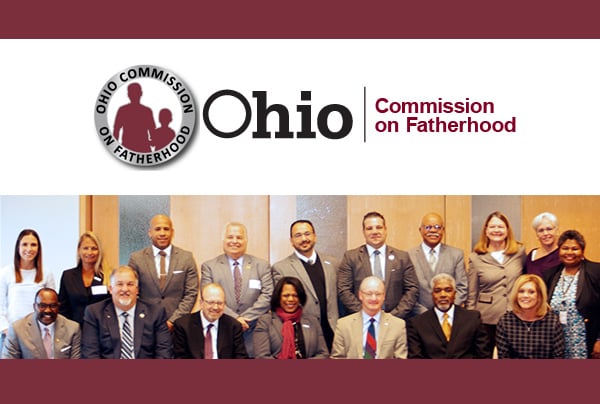
Posted: 05/30/2019
By Christopher A. Brown
NFI could not meet its mission without dedicated practitioners like Kim Dent with the Ohio Commission on Fatherhood (OCF). In the first part of this two-part post, Kim shared her background and role with OCF, how Ohioans view fatherhood, and how OCF has benefited from partnering with National Fatherhood Initiative® (NFI).
In this second part, I share what Kim thinks are the most important things fathers should know, what organizations working with fathers need to know, how states can support local organizations to serve fathers, and a short success story about a father served by one of OCF’s fatherhood grantees.
“Being there for your children in a healthy way is the most important thing for fathers to understand. Give them the time and love they deserve. Understand your value as their father and how your support and presence is crucial to their success. Financial support ensures that your children will have their basic needs met; your time and presence invested in your children will contribute to their healthy development. Be there, be intentional, and be consistent. Respect their mother and, if you’re no longer romantically involved with her and raising your children together, come to an amicable decision about how to raise them that will result in what’s best for your children, always. You’ll never have a more important job; nor a more fulfilling job, ever.
Moreover, even if you’re with your children’s mother, you need to respect her position in the home. If you’re a father who has come home from incarceration, for example, mom has had to run the household on her own. That transition upon reentry can be challenging for you both. You need to reenter with respect for what she has done even as you two discuss how to divide labor and work together to raise your children now that you’re back home.”
“The most important thing for organizations to understand when it comes to serving fathers effectively is that most fathers want to be there for their children. Don’t stereotype and judge fathers as non-factors and unimportant to their children. Remember that effective services for fathers contribute to the foundation of healthier more resilient families and better developed children. Many fathers didn’t have a father or positive male role model in their lives while growing up; therefore, they, too, are trying to learn what a good father looks like and how to be that for their children. Meet them where they are in a non-judgmental way. Programming for fathers is not cookie-cutter. Fathers require different supports, education, and resources during various stages of their journey as a dad.”
“The most important advice I have for any state on how to help organizations to serve fathers effectively is this: Children are our most precious gifts. Youth are your state’s future doctors, educators, service providers, pastors, business owners, judges, elected officials, farmers, factory workers, first responders, etc. Regardless of their future endeavors and dreams or goals, having good character, integrity, and respect for others is essential. State officials should research the social ills currently plaguing their states that negatively impact child well-being, child outcomes, and the health of their communities. Investing in supports for low-income fathers builds self-sufficient and resilient families, thus breaking the generational father absence trend and better develops children from infancy through their young adult years.
As far as steps states can take, the first thing is to remember that states serve families. A lot of the families served in one program are served in another program. They might access TANF, SNAP, child care. They might be involved in child protective services. Second, states have measures—outcomes they need to have to say their programs are successful in serving families. Third, states have to include all members of a family to succeed. States have done a good job providing services, resources, and information to moms and engaging them. They haven’t done the same with fathers. States have to figure out how to get that done. If states form relationships with local programs with expertise in engaging dads, it will help them be more successful with their state programs and positively affect their outcome measures. Government exists to serve families, especially those in crisis. States have to look at serving the whole family to ultimately benefit children.”
“After being in this field for nine years, and engaging fathers and families throughout the state, I have encountered many uplifting and inspirational ‘father stories.’ One of my favorites is the story of Mr. Carlos Christian, a father who was incarcerated at the age of 19 in the Marion Correctional Facility for 10 years. His parenting skills and ongoing support of his relationship with his son—who was three months old at the time of Carlos’ incarceration—resulted in Carlos obtaining custody of his son upon his release. Mom trusted Carlos to continue raising their son with the same values he instilled in him throughout the 10 years of his incarceration. Carlos’ own father and the mother of his son, Little Carlos, supported Carlos’ efforts to remain a vital and consistent part of his son’s life by bringing him to the prison for visits, allowing Carlos to send audio books of him reading to his son, etc.
Carlos has since written two books, one for incarcerated fathers and one for fathers re-entering into society post-incarceration. He is widely sought after as a speaker in state prisons in and outside Ohio and in federal prisons. Most recently, Carlos completed a documentary outlining his life and the work he put into becoming the businessman he is today. The documentary is called, “The Walking Logo.” Carlos is a facilitator, contracted by one of the current OCF grantees called Action for Children, and is also contracted by the Ohio Department of Youth Services to provide services to young fathers in the youth facilities. Carlos, as an Action for Children contracted facilitator, works closely with the local child support agency in Columbus to engage fathers when paternity is established.”
A huge thanks to Kim for her contributions to our blog to share about OCF’s excellent work to raise awareness across Ohio about the importance of fathers and support of local organizations to serve fathers.
To see an OCF program success story, watch this inspirational video from Lemar Turner, a Father2Father program participant.
To learn more about the Ohio Commission on Fatherhood, visit https://fatherhood.ohio.gov/.
See how to become a father-inclusive organization by visiting the following resources:

Receive our weekly email highlighting fatherhood news, events, programs, resources, and more!
Train Your Staff
Fatherhood Programs
Fatherhood Data
© 2026 National Fatherhood Initiative®. All rights reserved.